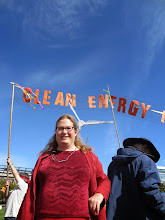Community Supported Agriculture meets Community Supported Energy...
A movement has sprung up in America- farmer's markets, community gardens, slow food clubs, and box-a-week subscription farms. Not a moment too soon, it would seem, as the second world food crisis in three years breaks upon us- with climate change as a major factor. The cost of conventional food is intimately linked to the cost of oil, both from oil's use in agriculture and from grain diverted to produce biofuels. The beauty of renewable energy is that it addresses the climate crisis, the energy crisis, and the food crisis at the same time. The beauty of solar panels is that they can be owned by individuals or community groups, they are getting cheaper fast, and with batteries can provide energy independent of the grid.
Let's look at just one city...
In 2010, Denver Urban Gardens started its 100th neighborhood garden (be sure to click the link and get your free seeds). FEED Denver Urban Farm turned a parking lot back into paradise and made acres of old Stapleton Airport into a working farm - benefiting people of all income levels. Denver Farmers Markets were thriving at six locations around the city, and statewide at least 90 operations offered farm shares. Transition Colorado worked throughout the state to educate about and prepare for the challenges at hand, in particular with regard to food security. I predict 2011 will be another record year for the local food movement.
By comparison, the community energy movement is fairly new- community owned wind has been around since about 2000, and the first community solar project was established in 2006. But if you ask people passionate about sustainability, you will find they are just as interested in relocalizing our energy as our food.
The Solar Gardens Institute's connection to the community garden movement is in part accidental, given our name. The Colorado law is named "community solar gardens" because subscribing to a patch of panels in a solar farm is like having a patch of ground to grow food in a neighborhood garden. People who grow food in a neighborhood garden are often those who don't have the space at home, are shaded by trees, or live in apartments. They believe in living sustainably and working together with their neighbors. Community gardeners are the same people who will join together in community energy projects. I think we've had a fortuitous accident!
Colorado's Community Solar Gardens Act encourages ownership by "agricultural producers". A farm can host a solar garden for ten or more subscribers, or can use a solar garden subscription to power its own operations. Either way, food labeled as "produced with renewable energy" will have a marketing advantage.
So, if you're involved in the community food movement, take the next step and make your group a community food and energy group! We are preparing to train "solar gardeners" - home-grown community energy developers. Gather your members, find a host site for solar panels or a wind turbine or two, let us know, and we will help you become a full fledged community-supported energy site.
Subscribe to:
Post Comments (Atom)


No comments:
Post a Comment